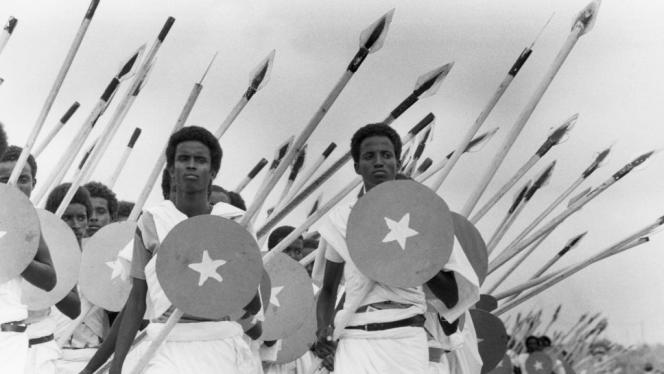Friday 22 November 2024
"Serio-comic": That time when Somalia seized an American freighter

In June 1970, Somalia seized a US freighter Midnight Sun for violating its territorial waters, sparking a small but bizarre diplomatic crisis between Washington and Mogadishu
Seizing ships is now back in vogue. Over the weekend, Iran comandeered an Israel-linked ship when members of its Revolutionary Guard Corps descended from a helicopter and took control of it. For months now, the Ansar Allah (the Houthis) have been enforcing a naval blockade of the Red Sea to UK, US and Israel linked ships. In November, the world was also surprised when it turned out ships sailing through the Gulf of Aden that we believed had been hijacked by the Houthis, had in fact been taken by Somali pirates. Before that they’d been dormant for years giving the impression that the problem had solved itself. One account on X posted: “They really came out of retirement to say Free Palestine.”
But after nosing around through the US’s archives I found that the problem has a much longer history. Well, one incident to be exact between the US government and the Somali government going back to the summer of 1970.
June 1970 was a pretty eventful month, so you might be forgiven for not having heard of this little-known incident in which the Somali government seized a small American freighter called The Midnight Sun (TMS) and forced it to dock for allegedly violating Somali territorial waters. That month the Tories won a general election swearing in Edward Heath as the new prime minister, the pacific Kingdom of Tonga joined the family of nations having achieved independence from the UK which inspired one Scottish enthusiast so much he penned a tribute, Brazil won its third World Cup and Ray Stevens released his hit feel good song “Everything is Beautiful”.
That wasn’t so for the eight crew members aboard the 180-ton ship. Five of the crew members were American and three were from Singapore. On the 25th of June, around 10 to 20 miles off the Somali coast TMS was given a given an order to stop as it passed through a part of the sea Somalia viewed as being within the 12-mile jurisdiction it exclusively claims. You would not need permission for an “innocent” ship to pass through such a territory, but authorities in Mogadishu didn’t see it that way.
According to a declassified State department memo the ship refused a stop order before a Somali naval vessel went into pursuit, firing warning shots until it got the message and stopped. The ship was then docked at the southern city of Kismayo. Marshall Wright, an Assistant secretary of state for congressional relations wrote a memo to Kissinger telling him that the State department first caught wind of the seizure through the office of a Texas based Democrat congressman, James Jarrell Pickle, who had been approached by the company which owned the ship the afternoon it was taken by Somali authorities.
“State is in touch with the company and has, of course, put our Embassy in Mogadiscio to work,” Wright wrote to Kissinger, “the problem is complicated by the fact that today is a Muslim holiday, and all the Somali government offices are closed.” The holiday he was referring to is likely Prophet Muhammad’s birthday, which was widely celebrated in Mogadishu. Wright went onto note that the US had recently terminated an aid program to Somalia but didn’t believe that the seizure was Mogadishu’s retribution. Wright’s assessment was that the issue be kept under wraps to avoid any unnecessary publicity which might harden the position of the Somalis. “I have asked State to suggest to the company that all publicity be avoided for the moment in the hopes that we can keep Somali nationalist pride from becoming a factor in the situation.” He then cautioned that the president should be made aware of this “cloud upon the horizon.”
Three days later the 28th of June the US embassy in Mogadishu returned a message to Washington providing an update on the situation which is also available online. The Chargé d’affaires met with the Director general of the Ministry of foreign affairs aiming impress upon Somali officials how serious the situation was for the Americans and requesting a political officer be allowed to interview the detainees in Kismayo. “The director general was courteous,” reported a US diplomat, who's only given name is Dennis, “but he regretted he still lacked the authority to approve trip to Chisimaio.” [They consistently insist on Italian spellings] The Somalis, he said, were furious that the vessel entered Somali waters without permission, didn’t display a flag and didn’t stop when requested. To make matters worse, the Somalis believed the electronic gear on the vessel wasn’t for research, implying but not explicitly stating, that it could have been for espionage. The diplomat retorted that the vessel had no links to the US government and the equipment was for seismic recordings. I also have no idea what was happening on this ship. It got weirder until this point, but not anymore.
Another factor muddying the waters on this case was a scheduled US navy visit to Kismayo ahead of US Independence Day celebrations in the southern port city. Somalia, then under Siad Barre, hadn’t at that point totally thrown its lot in with the Soviet Union and skirted a non-aligned path in its foreign policy inherited from Aden Abdulle Osman. You wonder if incidents like this eventually contributed to Barre’s hard swing later toward Moscow. The US diplomat who wrote the telegram to the State department advised the navy to visit to be “scrubbed” despite the “advanced state of preparations” if the crew weren’t released before that date. On July 2nd Kissinger received a memorandum from the Marshall Wright again. “Thus far, this situation has neither deteriorated, nor improved,” he wrote stoically, proceeding to simply list the good and bad things emerging from the situation.
I’ve re-pasted his scorecard verbatim:
The good:
- There has been no publicity, either on our side or on that of the Somalis.
- The Somali authorities have not yet officially charged the vessel even with navigational violations, much less with espionage.
- The Somalis have, finally, approved access to the five detained Americans by one of our consular officers. He will be travelling from Mogadiscio to Chisimaio on July 4.
- The atmosphere in Chisimaio is calm and friendly, with the Americans stationed there included in the official Independence Day celebrations on July 1.
- General Siad's Independence Day message was totally bereft of any anti-American tone, which is notable in itself and may indicate that the Somalis are not contemplating making a big deal out of the Midnight Sun.
- The five detained Americans are apparently being kept in a hotel and are being well treated.
And the bad (which outnumbers the good as you might have anticipated):
- The Somalis have cancelled a visit to Chisimaio scheduled to begin on July 3 by a U.S. destroyer.
- It has now been a full week since the Midnight Sun was seized, and we have not yet been able to come to grips with Somali authorities on what will be necessary to affect the release of the vessel and its detained crew.
- We have good indications that the Somalis do not believe that the seismic research equipment aboard the Midnight Sun is truly seismic research equipment.
- The most worrisome part of this matter is the way it must appear to a Somali, even a fair-minded one. From their point of view, this is what happened:
- An unauthorized vessel penetrated their territorial waters.
- It refused to respond to a query from a coastal observation post.
- After a long chase it was overtaken by a Somali patrol boat.
- It was flying no flag.
- It refused the patrol boat's order to heave to until fired upon.
- It then ran up an American flag and on investigation was found to be full of very sophisticated electronics equipment. Obviously, from the Somali point of view, the strong suspicion arises that they have intercepted an American “spyship”.
The Americans appear to have had some sympathy for why the Somalis were both completely pissed and suspicious. But the ship, Wright insisted was as clean as a “hound’s tooth”. The Americans responded to the problem like a clumsy teenager struggling to court a potential suitor. “We are playing it cool, lest excessive interest on our part serve to confirm Somali suspicions of U. S. Government involvement,” he wrote to Kissinger.
Resolving issues is generally easier when the masses & journalists aren’t aware of the matter. It is easier to negotiate and compromise away from the scrutinising eye of public opinion, otherwise you may be forced into taking actions which help save face but could be detrimental. That came to pass in this case when Washington Post columnist Evans Novak revealed previously undisclosed on the ship seizure, contributing to growing tensions between Washington and Mogadishu.
Novak attributed the ship’s seizure to “steadily rising Russian influence” in Somalia and East Africa. In another declassified memorandum written by Wright for Kissinger dated July 31st, he lamented the fact that they weren’t able to solve the issue before it reached the press. The language in the memorandum suggests some progress was made and that the US was waiting for a message on Somalia’s decision. “The Somali Ambassador in Washington has been under instructions for 5 days to deliver a note from General Siad to President Nixon informing us that the vessel and crew will be released,” Wright told Kissinger. The note, however, couldn’t be delivered because the “Somalis cannot decode the message, even after several retransmissions.” In characteristic swipe at the Russians Wright said, “they have new coding machines - doubtless provided by the Russians - and just cannot make them work properly.”
A breakthrough eventually came on 4th August. The Somali government decided to release The Midnight Sun “as an indication of goodwill and in the light of the evident desire for mutual cooperation between the two countries,” the Somali government said in a statement reported by the US embassy in Mogadishu. In a message sent to the secretary of state, the Somali government re-stated the list of violations and demanded that the US “ensure that such violations will not occur under any circumstance.” The Somali government declared the issue closed and added that no further claims could be made from the Americans.
I hate saving the funniest bit for last but chronology here is important. Kissinger eventually wrote a note on the entire incident for President Nixon which he described as “serio-comic”. In a message dated on the 12th of August, Kissinger wrote: “After six frustrating weeks and several serio-comic false starts, we have finally succeeded in getting The Midnight Sun and its crew released by the Somali Government.” The crew he said was always treated well, but the issue got prolonged because the message declaring the crew’s release couldn’t be delivered due to some issue with a coding machine in Somalia’s Washington embassy. I am still trying to find out if the Somalis delayed the message to buy themselves time to find out if the ship was for espionage or if the machine broke down.









